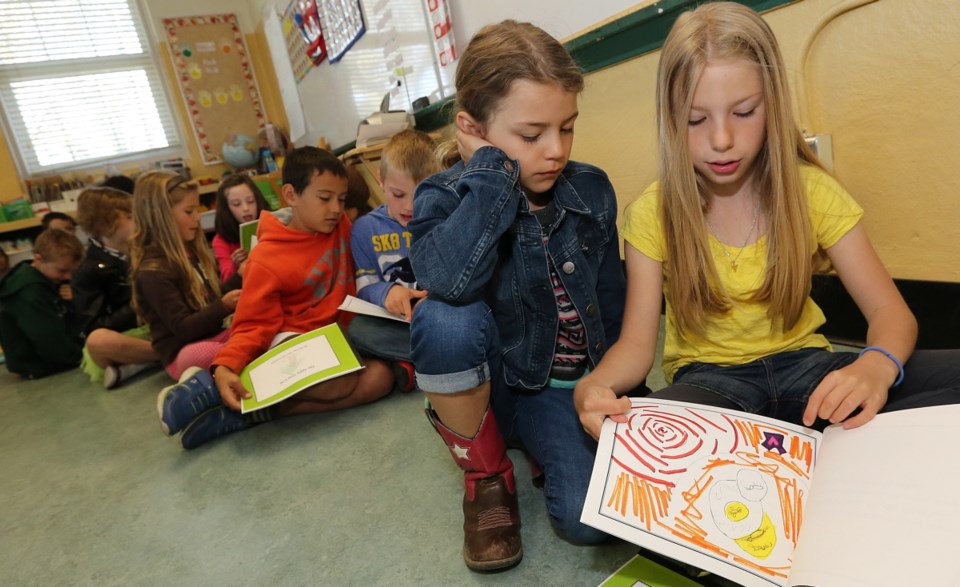Authors and illustrators of children’s literary classics such as The Alien Guy Named Bob and Super Raccoon Learns to Jump gathered in Victoria Thursday to compare stories and ideas.
These writers, however, also happened to be the same people who drew the pictures. They were also seven and eight years old, part of a Grade 2 language arts class at Margaret Jenkins elementary, and picking up their own printed first editions.
Maya Djurickovic, creator of Super Raccoon, said she was inspired by two things: Superhero stories can be really funny, and raccoons are always getting into her family’s garbage cans.
Rene Tolson, originator of The Alien Guy Named Bob, meanwhile, was too busy with pals to comment.
The class, the books and the lesson were all part of a creative-writing program offered by the Victoria not-for-profit organization Story Studios Writing Society. It’s a program designed to teach kids the elements of fiction by creating their own stories.
In the program, four volunteers, including professional authors, attend the class for three sessions. Children receive help to create their own characters, develop their plots and wrap up their stories. They also create illustrations, up to six or more, for each book.
Story Studios then collects the pictures and written ideas and stories, and has them transcribed and professionally printed into individual books, each with a small paragraph on the back providing the child author’s biography.
Story Studios founder Paisley Aiken, a Victoria mother of three children between the ages of five and 10, said in the past 18 months, the group has been to more than 40 classrooms, from kindergarten to Grade 8, and helped more than 700 children write their own printed books.
Aiken, who has worked with children in the Cayman Islands and also owned a bookstore in Gibsons, said she got the idea for Story Studio from a San Francisco venture called 826 Valencia.
She later worked with professional educators in Victoria to develop the format of Story Studio’s writing sessions.
The first session focuses on the development of character and introduces children to settings.
Younger children are given modelling clay to create their characters, a manual exercise that helps those who are stumped for ideas. They also act in small drama sessions, talking in the voices their characters would use.
“We do everything we can so the kids will not copy a character from a book or a movie,” Aiken said.
She said students focus later on describing a setting using details derived from their own senses. They are given things to smell, like pine needles, or told to listen to things like water falling into a bucket. They are then asked to put these sensory experiences into their own words and use the techniques in their stories.
Throughout the sessions, the children are taught to think of their stories as objects with their own structure, like a sandwich, with two sides — the beginning and end — with the filling being the meat of the story.
“We also call it the building blocks of making a story,” Aiken said.
“For kids, even the strongest writers will start writing and it will go on and on and on,” she said. “This way, they actually complete a story.”
Story Studio does not attempt to teach penmanship, spelling or grammar. In some cases, the adult volunteers will act as scribes to take down the children’s stories.
The goal is to foster in children an appreciation for books and literacy.
“Children can sometimes see themselves as not successful in school because they have difficulty with something like penmanship,” she said
“We’re there to help them see themselves as people with valuable thoughts and ideas worth sharing.”
Nicole Strong, a Grade 2/3 teacher at Margaret Jenkins elementary, said the Story Studio sessions surprised her with their ability to hold the attention of even reluctant learners.
Strong said all the students stayed focused. Even sessions such as modelling their characters in clay did not degenerate into unruly play.
“It was actually quite amazing to see,” Strong said. “And they all got to share in it, no matter what stage they were at with their writing development.”
You can help
Story Studio Writing Society welcomes assistance from anyone interested in seeing children publish their own special stories.
The registered non-profit group relies upon sponsors and donations to provide the $600 per class, or $33 per child, to put on the three writing sessions and print up an individual book for every child.
To date, notable assistance has been received from The Q, TLC Fund, the Royal Bank of Canada and AbeBooks.
Anyone who wishes to help can contact the group by going to storystudio.ca.



